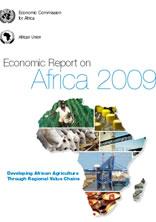Economic Report on Africa 2009

Economic growth in Africa declined to 5.1 per cent in 2008 and is projected to fall sharply in 2009. Despite high commodity demand and prices in the first half of 2008, continued sound macroeconomic management and commitment to economic reforms, increased domestic investment and productivity, recent debt write-offs, private capital flows, increased non-fuel exports and consolidation of peace in some parts of the continent, the global financial crisis and recession are adversely influencing medium-term growth prospects in Africa.
Progress towards meeting the targets of the MDGs has been mixed, with some noticeable gains in universal primary education but very limited headway on poverty reduction and health-related goals. In particular, Africa has to strengthen gender equality and women empowerment as factors strongly correlated with other social development goals. Given the recurrent food shortages and slow progress in poverty reduction, the continent needs sustained investment for agricultural transformation in agricultural production systems, agricultural research and extension services, use of yield-enhancing practices and technologies, increased investment in soil and water conservation, and improved
marketing and rural infrastructure.
Africa must also build linkages between agriculture and manufacturing, and with other sectors at national and regional levels. Increased investment in agribusiness and agroprocessing aximizes value added, expands markets, creates jobs and enhances productivity and international competitiveness. Regional value chains and markets will help Africa overcome the constraints of small national markets and populations, and optimize its diverse but fragile agro-ecological systems. These initiatives and measures to enhance regional trade and investment are essential to stimulate agricultural transformation and broad-based growth.